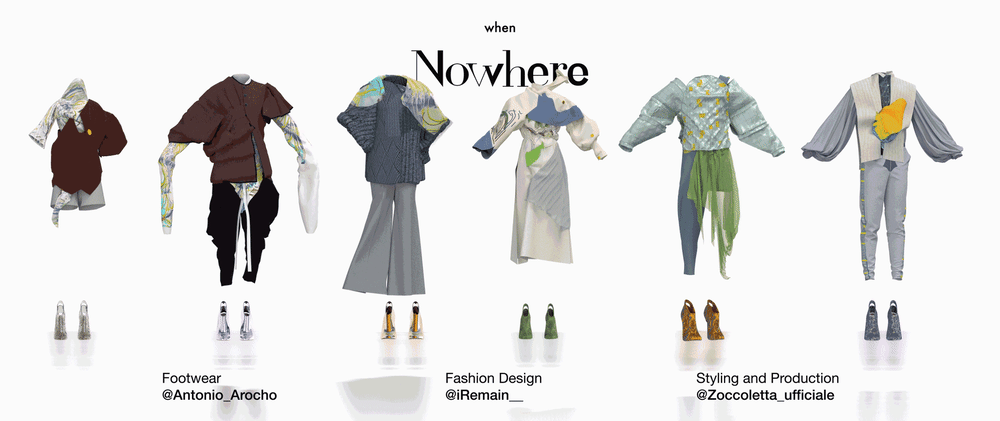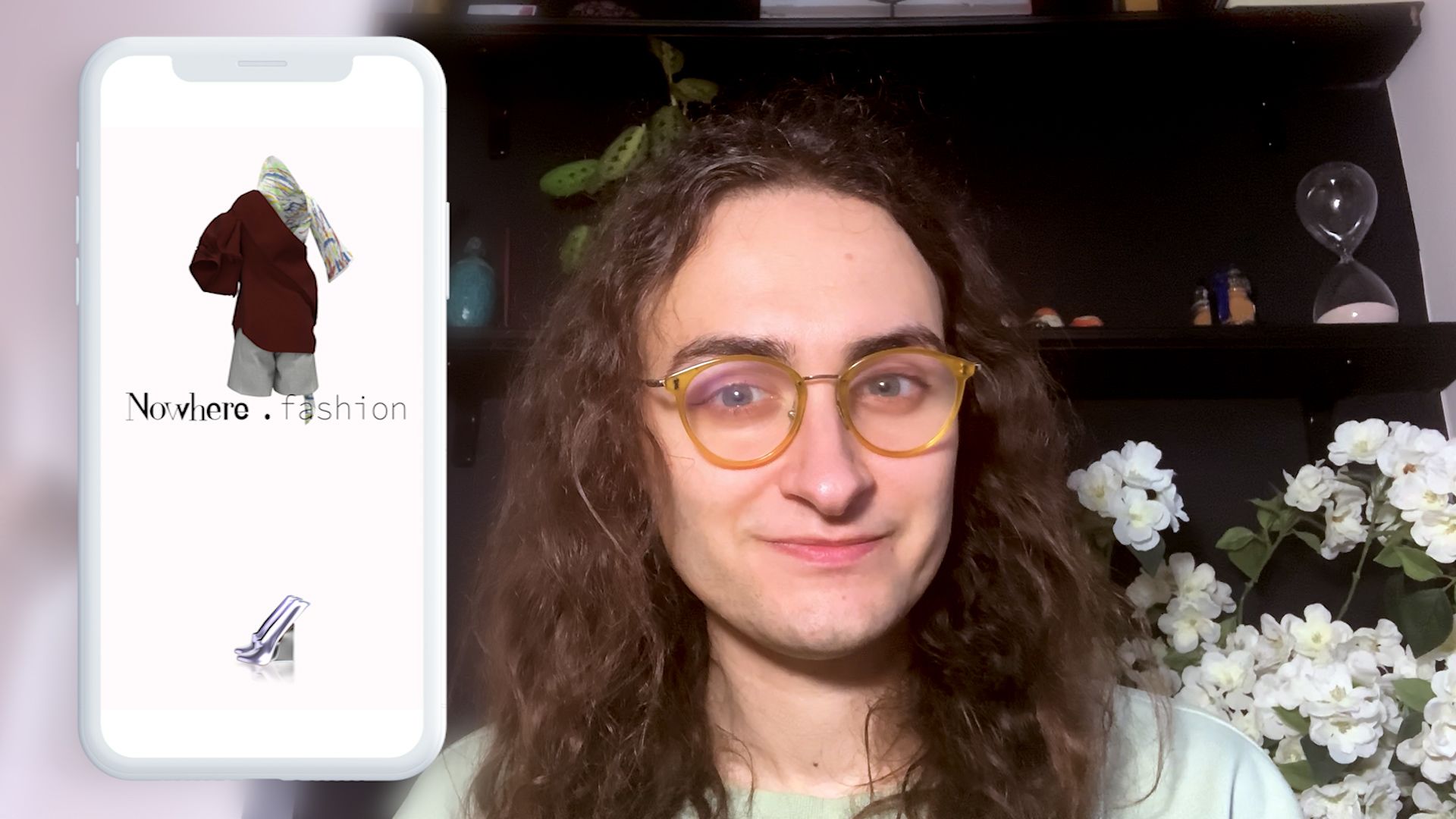
Alumni Spotlight: Romain Potier explores themes of gender and inclusivity within the fashion industry with their project Nowhere.fashion

- Written byC. Prina
- Published date 15 November 2022

We recently caught up with BA (Hons) Fashion Design alumni, multimedia designer, and Founders club member, Romain Potier, to discuss their project ‘Nowhere.fashion’- an online platform that challenges the constraints of perceived gender within the fashion industry and explores digital design as a way to embrace and champion diversity and inclusivity, whilst also reducing environmental impact.

Hi Romain, it’s great to talk to you. Can you tell us about your enterprise journey so far?
I think I'm still only at the very beginning of my enterprise journey as I started a BA (Hons) Fashion Design course at LCF in 2016. I came over from France with a BA in Multimedia Communication and Filmmaking and I started to take on graphic design and videography jobs with UAL Arts Temps which is a great way to understand how the university works. After graduating I kept doing freelance work for fashion brands, creating visual identities, and producing marketing content such as 3D garments. It was during this time, seeing businesses come to life, that I kept thinking about my own fashion enterprise project. It is motivating to see that by working with start-ups you realise that they don't have everything figured out before starting their business. That encouraged me to start my own business.
Working for others before starting your own business is a very insightful and inspiring way to see how they evolve
How did the idea for your project Nowhere. fashion come about?
I came to London to merge my digital and multimedia skills with the knowledge I would learn at LCF on a design course. I have always been annoyed by the strict menswear/womenswear labelling of clothing and I thought that there must be a way to design clothes for body shapes instead of perceived gender and whilst at the Curtain Road Campus, looking at the different dressing forms, being a transgender person, I realised that trans bodies are nowhere to be found. And that’s when the idea started. Everyone has a different body shape: tall, Short, curvy, having a physical disability, etc. Finding clothes that fit is actually more difficult for more people than we think.
Nowhere.fashion is a project I have been working on for 2 years now. Not only could I not find clothes that I liked that also fit my body shape, but the way we design clothes is deeply binary. Talking with people around me I quickly learned that this affected a lot of people. It's often a case of compromising certain aspects over others to fit the sizing norms. So, I wondered ‘what if we were not supposed to fit any box?’ Also, in the second year of the course, we had an entire module about sustainability in fashion. I had a vague idea of the impact of the fashion industry on the environment when starting the course but didn’t realise how bad it was. I learned that the fashion industry creates a lot of waste in the making process which led to a research project looking into reducing waste and offering made-to-measure solutions. Designing clothes digitally in 3D can be the solution to both issues. By sampling garments digitally, it becomes easy to import an avatar to the size of the customer and adapt the design to the avatar's size on the screen. This way the clothes can be made to order which reduces fabric waste. What if instead of feeling like we belong nowhere in what is imposed on us, we could simply and truly be ourselves - 'now, here'?

You recently entered the Tata Varsity Pitch competition, can you tell us about the competition process and why you decided to enter?
I am subscribed to the Founders Club newsletter and received an email regarding the competition. It came at a time where I think I needed a push. I tend to try to get everything perfect before putting it out there. That means that quite often I don't share ideas or concepts that could evolve by talking about it with others whose input can improve the direction of the project, so the Tata Varsity Pitch felt like a good opportunity to push myself outside of my comfort zone.
Having to narrow down your business to a one-minute pitch is quite challenging but allows you to define what's important to say and how to catch people's attention.
I didn't get a chance to progress to the next stage of the competition, but I had overwhelming support and ended up in the top 10 competitors of the online people's vote. This competition pushed me to establish and kickstart the company which I probably wouldn't have done otherwise. The competition motivated me to participate in other competitions, not necessarily to win but to keep being present on the fashion scene and keep working towards my goal.
How did LCF and particularly LCF Graduate Futures, support you with your enterprise aspirations?
LCF and UAL have a lot of events and different support teams and it's easy to get lost in the array of things happening. I came across LCF Graduate Futures through Moodle and once I had the initial idea, I needed some guidance on where to start, what do to first, and how to get help. I had a 1-to-1 session with Graduate Futures' Head of Enterprise Consultants, Frances Odell, who was very helpful and suggested that I take part in the then SET challenge and said that we learn best by doing and by making mistakes.
I learned that protecting the IP is one of the first things to do especially if you have a unique name that you want to use for your business. But mostly, if you think your idea is completely original, it's probably not! That's my key takeaway from the support I received from Graduate Futures! What matters is how you approach it and what your own unique selling proposition is. You have no control over what other businesses do, and they don't have to be competitors, we can work together to fill different gaps in the market.

What projects are you currently working on?
I'm currently working on developing Nowhere.fashion and I'm also working on creating new digital designs either fully digital or that could be adapted to be manufactured. I'm also looking for designers who share the same interest in inclusive and sustainable fashion and who would be interested in having their clothes on the Nowhere.fashion platform. The next stage for Nowhere.fashion is to have a proof of concept that can be shared to attract interest and do as much user testing as possible. Especially since this platform puts the customer at the heart of it.
It's important to not make the mistake of projecting what we think people want, but learn what their expectations are.
Finally, what advice can you give to students who are about to embark on their enterprise journeys?
I would say, don't hesitate to try different things. Everything you'll learn will be beneficial, whether it's a retail job or exhibiting your work. Every skill is transferable. Do some freelance work with start-ups as that's the best way to learn how other people are running their businesses. Also, don't be afraid to share your ideas with others. LinkedIn seems to be a good place to do this. I didn't believe early enough how powerful LinkedIn is for networking, because when your project comes to fruition, you'll have people who are already interested in what you're doing and happily support you and share this with others.
A fascinating and thought-provoking conversation. Thank you for your time, Romain. We wish you all the best with the project!
- Connect with Graduate Futures
- What’s on at LCF: open days and events
- More LCF Stories